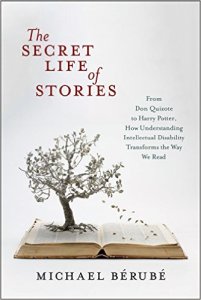
Bérubé, Michael. The Secret Life of Stories: From Don Quixote to Potter, How Understanding Intellectual Disability Transforms the Way We Read. New York: NYUP, 2016. Print.
Summary: Regardless of whether a book features a disabled person, says Bérubé, all literature on the whole is haunted with intellectual disability in some way. At times, disability sparks or corrupts motives, generating a more compelling plot. But for the cleverest of writers, intellectual disability illuminates and elevates the entire text by disabling the narrative in a way that makes more “abled” readers work hard to decode the the story while simultaneously gaining a better understanding of what it is like to have a disability.
Critique: The title drew me in. Suckered, more like. Stories have a secret life? Just like bees??? And that secrecy has something to do with disability? Count me in as curious!
Reading Bérubé’s touching introduction about his youngest son’s intellectual disability set me up to think the text that followed was going to be intellectual creative nonfiction à la E. O. Wilson. But unfortunately, the book reads like a PhD dissertation. Didactic scholarly tone. Long sentences that tie their own grammatical and syntactical Celtic knots. Plenty of phrases like, “within the wider discursive structure of relations among different levels of text….” More fun than the obfuscated tone is Bérubé’s way of spurring cat-fights among his colleagues–calling them out for shoddy research or inept theories. I was sure, at any moment, he was going to scwatch their widdle wesearching eyes out!!!
That said, Bérubé still introduced me to a topic I very much much wanted to meet. (And I do thank him for an intelligent introduction, at that. I am now better informed than I was.) He provided many analytical ins where before I’d met locked doors. His example texts welcomed me into the conversation, even if his erudite style did not.
I would say this is a very good book for students learning how to do a close, critical reading of a text. And as a sort of geek-bonus, Bérubé’s endnotes are chatty and witty. In one example, Bérubé notes, “I am borrowing this argument from Janet Lyon, who will eventually want it back.”
For a very touching initiation into the topic of disability its tangible link to literature, I suggest Lauren Davis’ “Reading Through Trauma: How Story Helped Us Navigate Through Challenging Days.”
Comments